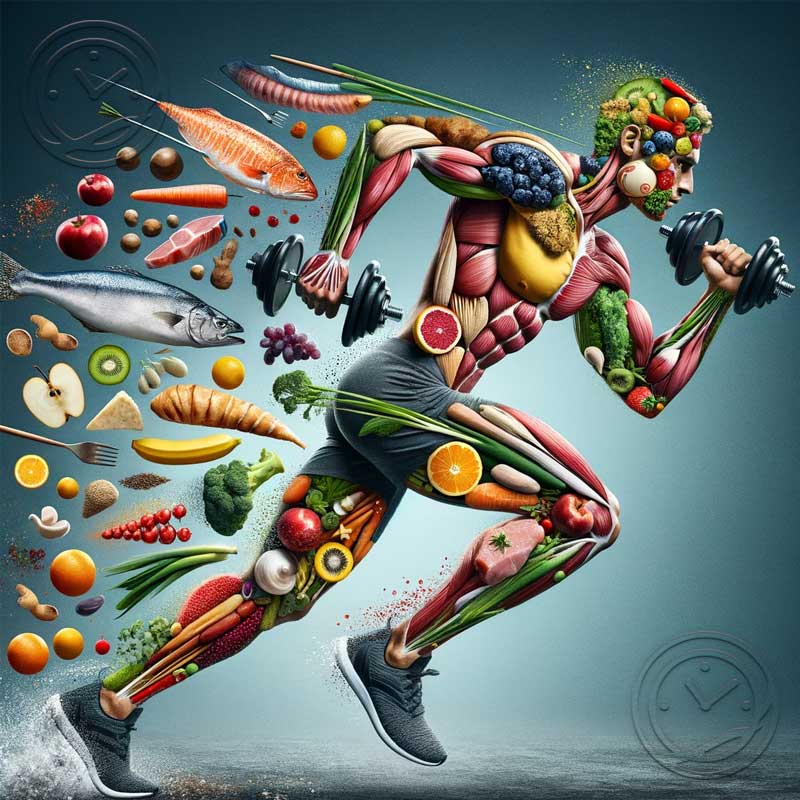Introduction
Many athletes are looking for ways to improve their performance. One way to do this is by eating a healthy and nutritious diet. The Danish Diet is a good option for athletes because it is high in whole grains, fruits, vegetables, and fish. These foods provide the nutrients that athletes need to perform at their best.
The Danish Diet is also low in saturated fat, cholesterol, and sodium. This makes it a good choice for athletes who are trying to control their weight or improve their heart health.
In this article, we will discuss the benefits of the Danish Diet for athletes. We will also provide tips on how to follow the diet and avoid common nutrition mistakes.
What is the Danish Diet?
The Danish Diet is a healthy and nutritious diet that is based on the traditional foods of Denmark. It is rich in fruits, vegetables, whole grains, and fish. The Danish Diet is also low in saturated fat, cholesterol, and sodium.
- The Danish Diet is rich in fruits and vegetables.
- The Danish Diet is high in whole grains.
- The Danish Diet is low in saturated fat, cholesterol, and sodium.
- The Danish Diet is a good source of protein, vitamins, and minerals.
The Danish Diet is a healthy and nutritious diet that can help you maintain a healthy weight, reduce your risk of chronic diseases, and improve your overall health and well-being.
Discover the secrets of the Danish diet menu, a healthy and balanced culinary journey that boasts a rich array of…
Danish Diet for Athletes
The Danish Diet is a healthy and nutritious diet that is based on the traditional foods of Denmark. It is rich in fruits, vegetables, whole grains, and fish, and it is low in saturated fat, cholesterol, and sodium.
The Danish Diet is a good choice for athletes because it provides the nutrients that they need to perform at their best. The high levels of fruits, vegetables, and whole grains in the Danish Diet provide athletes with energy, carbohydrates, vitamins, minerals, and fiber. The high levels of fish in the Danish Diet provide athletes with protein, omega-3 fatty acids, and other nutrients that are essential for good health and performance.
The Danish Diet is also a good choice for athletes because it is relatively easy to follow. The foods that are included in the Danish Diet are all healthy and nutritious, and they are also affordable and accessible.
If you are an athlete, you may want to consider adopting the Danish Diet. It is a healthy and nutritious diet that can help you to perform at your best.
Benefits
The Danish Diet 13 days is a healthy and nutritious diet that is based on whole foods. It is rich in fruits, vegetables, whole grains, and fish. This diet is low in saturated fat, cholesterol, and sodium. It is also a good source of protein and fiber.
There are many benefits of the Danish Diet for athletes. These benefits include:
- Improved performance
- Reduced risk of injury
- Increased recovery
- Better sleep
- Reduced inflammation
- Improved mood
- Lowered risk of chronic diseases
If you are an athlete, the Danish Diet is a great way to improve your performance and overall health.
Intermittent Fasting for Seniors
Unlock the secrets of a healthier, more vibrant life in your golden years with Intermittent Fasting for Seniors. This strategic…
Foods to Eat
The Danish Diet for Athletes is based on a healthy and balanced diet that includes plenty of fruits, vegetables, whole grains, and lean protein. Athletes should also consume plenty of fluids, especially water, to stay hydrated.
Here are some specific foods that are good for athletes on the Danish Diet:
- Fruits: Apples, bananas, berries, oranges, grapefruit, melons
- Vegetables: Broccoli, carrots, cucumbers, leafy greens, peppers, tomatoes
- Whole grains: Brown rice, quinoa, oats, whole-wheat bread, whole-wheat pasta
- Lean protein: Fish, chicken, lean beef, tofu, beans, lentils
- Healthy fats: Olive oil, avocado, nuts, seeds
Athletes should also avoid processed foods, sugary drinks, and excessive amounts of saturated and trans fats.
How Much to Eat?
The amount of food you eat on the Danish Diet for Athletes will depend on your individual needs, such as your age, activity level, and weight goals. However, there are some general guidelines that you can follow.
- Eat 3-4 meals per day, and 2-3 snacks.
- Make sure to eat plenty of fruits, vegetables, and whole grains.
- Choose lean protein sources, such as fish, chicken, and beans.
- Limit your intake of processed foods, sugary drinks, and unhealthy fats.
For more specific information on how much to eat on the Danish Diet for Athletes, you can consult with a registered dietitian.
Danish Diet for Diabetes Control
Discover the Danish Diet, a powerful ally in managing diabetes and promoting overall health. Based on the wholesome traditions of…
When to Eat?
The Danish Diet is a flexible diet that can be adapted to fit your individual needs and lifestyle. However, there are a few general guidelines that you can follow when it comes to when to eat on the Danish Diet for athletes.
- Eat breakfast within 30 minutes of waking up.
- Have a snack mid-morning and mid-afternoon.
- Eat a large dinner at least 3 hours before bedtime.
It is important to eat regular meals and snacks on the Danish Diet for athletes in order to maintain your energy levels and keep your metabolism running smoothly. Eating breakfast within 30 minutes of waking up is especially important, as this helps to jumpstart your metabolism and give you energy for the day. Snacking mid-morning and mid-afternoon can help to prevent you from getting too hungry and overeating at dinner. Eating a large dinner at least 3 hours before bedtime can help to improve sleep quality and reduce the risk of overeating the next day.
It is also important to listen to your body and eat when you are hungry. If you are feeling hungry, it is better to eat a small snack than to wait until you are starving and then overeat. Eating when you are hungry will help to keep your blood sugar levels stable and prevent you from feeling tired and sluggish.
Following these general guidelines can help you to eat a healthy and nutritious diet that is tailored to the needs of athletes. By eating regular meals and snacks, you can maintain your energy levels, improve your performance, and reduce your risk of injury.
Tips for Following
Eat plenty of fruits and vegetables. Fruits and vegetables are packed with vitamins, minerals, and fiber, all of which are essential for athletes. Make sure to include a variety of fruits and vegetables in your diet, and try to eat them at least twice a day.
Choose whole grains over refined grains. Whole grains are a good source of complex carbohydrates, which provide energy for your workouts. Choose whole-wheat bread, brown rice, and oatmeal over white bread, white rice, and instant oatmeal.
Eat plenty of lean protein. Protein is essential for building and repairing muscle tissue. Choose lean protein sources such as fish, chicken, turkey, and tofu.
Limit your intake of unhealthy fats. Unhealthy fats, such as saturated and trans fats, can increase your risk of heart disease and other health problems. Limit your intake of unhealthy fats to less than 10% of your total daily calories.
Drink plenty of water. Water is essential for staying hydrated, especially during exercise. Drink at least eight glasses of water per day, and more if you are exercising heavily.
Get enough sleep. Sleep is essential for overall health and well-being, including athletic performance. Aim for 7-8 hours of sleep per night.
Manage stress. Stress can negatively affect your athletic performance. Find healthy ways to manage stress, such as exercise, yoga, or meditation.
See your doctor regularly. Your doctor can help you stay healthy and on track with your athletic goals. Make sure to see your doctor regularly for checkups and screenings.
Common Nutrition Mistakes Athletes Make
Here are some common nutrition mistakes that athletes make:
- Not eating enough calories. Athletes need to eat enough calories to fuel their workouts and recovery. If you are not eating enough calories, you may experience fatigue, loss of muscle mass, and decreased performance.
- Not eating enough protein. Protein is essential for building and repairing muscle tissue. Athletes who do not eat enough protein may not be able to recover from their workouts as quickly and may be more prone to injuries.
- Not eating enough carbohydrates. Carbohydrates are the body’s main source of energy. Athletes who do not eat enough carbohydrates may experience fatigue during workouts and may not be able to perform at their best.
- Eating too much junk food. Junk food is high in calories and low in nutrients. Athletes who eat too much junk food may gain weight and may not be able to perform at their best.
- Skipping meals. Skipping meals can lead to fatigue, hunger, and poor performance. Athletes should eat regular meals and snacks throughout the day to keep their energy levels up.
- Not drinking enough fluids. Dehydration can lead to fatigue, impaired performance, and increased risk of injury. Athletes should drink plenty of fluids before, during, and after workouts to stay hydrated.
How to Avoid Nutrition Mistakes
The Danish Diet is a healthy and nutritious diet that can be a great option for athletes. However, there are a few nutrition mistakes that athletes can make on the Danish Diet.
- Not eating enough carbohydrates. Carbohydrates are an important source of energy for athletes, and they should make up about 50-60% of your total caloric intake on the Danish Diet.
- Not eating enough protein. Protein is essential for building and repairing muscle tissue, and it should make up about 20-25% of your total caloric intake on the Danish Diet.
- Not eating enough fruits and vegetables. Fruits and vegetables are packed with vitamins, minerals, and fiber, and they are an important part of any healthy diet. Athletes should aim to eat at least 5 servings of fruits and vegetables per day on the Danish Diet.
- Not drinking enough water. Water is essential for staying hydrated, and it is especially important for athletes who are sweating a lot. Athletes should aim to drink at least 8 glasses of water per day on the Danish Diet.
By avoiding these nutrition mistakes, athletes can make the Danish Diet a healthy and effective way to fuel their performance.
Conclusion
The Danish Diet is a healthy and nutritious diet that can be beneficial for athletes. It is rich in fruits, vegetables, whole grains, and fish, and it is low in saturated fat and cholesterol. This diet can help athletes to improve their performance, recover from injuries, and reduce their risk of chronic diseases.







